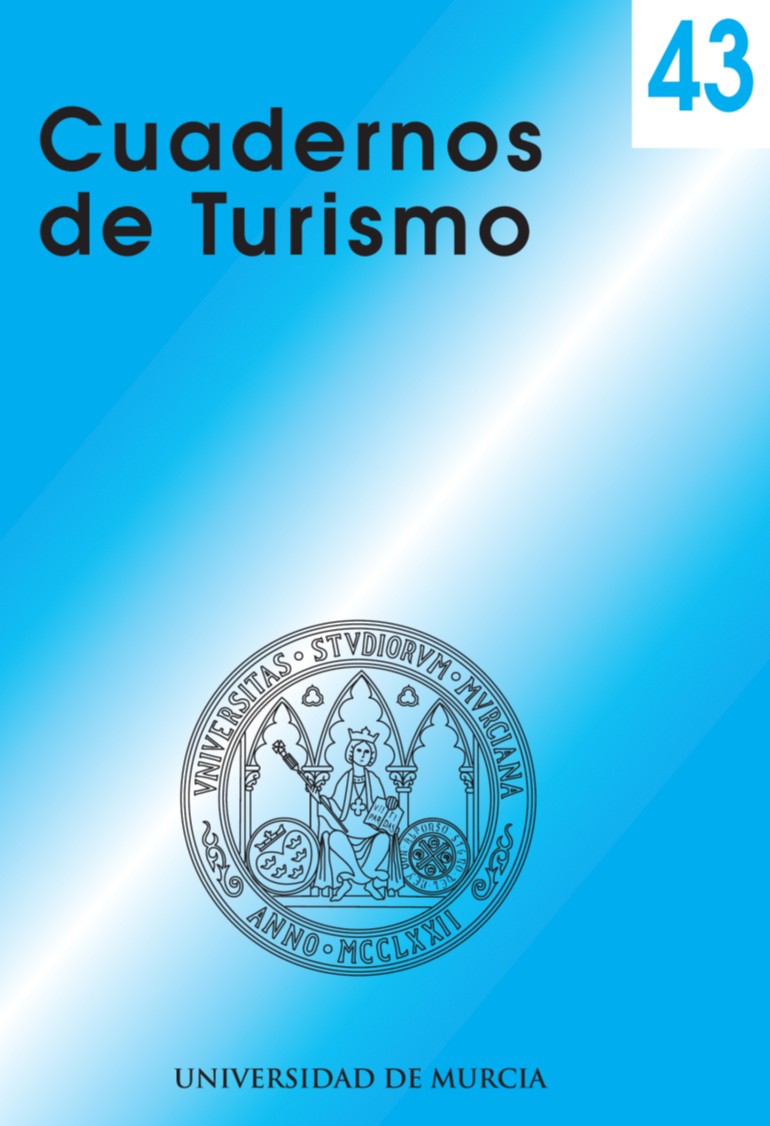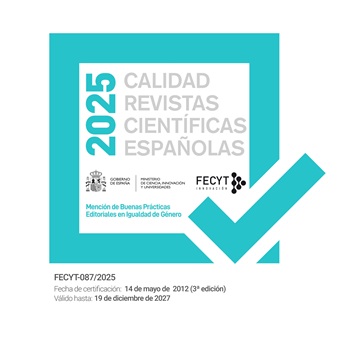Exploring the links between tourism and quality of institutions
Abstract
This paper introduces a new perspective on the impacts of tourism on host communities by analyzing the links between tourism specialization and quality of institutions. Our research has two principal aims: firstly, to test the significance and sign of this relationship; and secondly, to explore the channels through which tourism could affect institutional quality. To this end, an econometric analysis is conducted using a sample of 92 countries over the period 1995-2014. The results indicate that there is a significant and positive association between tourism specialization and institutional quality. Moreover, this relation can be explained through three main channels: level of income, income inequality, and economic freedom.
Downloads
-
Abstract781
-
PDF759
-
PDF (Español (España))759
References
ACEMOGLU, D.A., JOHNSON, S. and ROBINSON, J.A. (2001): «The colonial origins of comparative development: An empirical investigation», American Economic Review, vol. 91 (5), pp. 1369-1401.
ADES, A. and DI TELLA, R. (1999): «Rents, competition, and corruption», American Economic Review, vol. 89 (4), pp. 982-993.
ADSERA, A., BOIX, C. and PAYNE, M. (2003): «Are you being served? Political accountability and the quality of government», The Journal of Law, Economics and Organization, vol. 19 (2), pp. 445-90.
ALESINA, A., DEVLEESCHAUWER, A., EASTERLY, W., et al. (2003): «Fractionalization», Journal of Economic Growth, vol. 8 (2), pp. 155-194.
ALESINA, A. and GIULIANO, P. (2015): «Culture and institutions», Journal of Economic Literature, vol. 53 (4), pp. 898-944.
ALESINA, A. and LA FERRARA, E. (2005): «Ethnic diversity and economic performance», Journal of Economic Literature, vol. 43 (3), pp. 762-800.
ALESINA, A. and PEROTTI, R. (1996): «Income distribution, political instability and investment», European Economic Review, vol. 40 (6), pp. 1203-1228.
ALONSO, J.A. and GARCIMARTÍN, C. (2013): «The determinants of institutional quality, more on the debate», Journal of International Development, vol. 25 (2), pp. 206–226.
ALTIN, M., MEMILI, E. and SÖNMEZ, S. (2017): «Institutional economics and firm creation in the hospitality and tourism industry: A comparative analysis of developing and developed economies», Tourism Economics, vol. 23 (7), pp. 1381-1397.
AUER, R.A. (2013): «Geography, institutions, and the making of comparative development», Journal of Economic Growth, vol. 18 (2), pp. 179-215.
BARRO, R. and LEE, J-W. (2013): «A new data set of educational attainment in the world, 1950-2010», Journal of Development Economics, vol. 104, pp. 184-198.
BEERLI, A. and MARTÍN, J.D. (2004): «Factors influencing destination image», Annals of Tourism Research, vol. 31 (3), pp. 657-681.
BLAKE, A. (2008): «Tourism and income distribution in East Africa», International Journal of Tourism Research, vol. 10 (6), pp. 511-24.
BRAU, R., DI LIBERTO, A. and PIGLIARU, F. (2011): «Tourism and development: A recent phenomenon built on old (institutional) roots? », The World Economy, vol. 34 (3), pp. 444-472.
BRUNETTI, A. and WEDER, B. (2003): «A free press is bad news for corruption», Journal of Public Economics, vol. 87 (7), pp. 1.801-1.824.
CASAS JURADO, A.C., SOLER DOMINGO, A. and JAIME PASTOR, V. (2012): «El turismo comunitario como instrumento de erradicación de la pobreza: Potencialidades para su desarrollo en Cuzco (Perú)», Cuadernos de Turismo, nº 30, pp. 91-108.
CROES, R. and VANEGAS, M. (2008): «Cointegration and causality between tourism and poverty reduction», Journal of Travel Research, vol. 47 (1), pp. 94-103.
DAHLBERG, S., HOLMBERG, S., ROTHSTEIN, B. et al. (2016): The quality of government basic dataset, version Jan16. University of Gothenburg: The Quality of Government Institute. Retrieved from: http://www.qog.pol.gu.se, doi:10.18157/QoGBasJan16.
DAS, J. and DI RIENZO, C. (2010): «Tourism competitiveness and corruption: a cross-country analysis». Tourism Economics, vol. 16 (3), pp. 477-492.
DWYER, L., FORSYTH, P. and SPURR, R. (2004): «Evaluating tourisms economic effects: New and old approaches», Annals of Tourism Research, vol. 25 (3), pp. 307-317.
DWYER, L. and KIM, C. (2003): «Destination competitiveness: determinants and indicators», Current Issues in Tourism, vol. 6 (5), pp. 369-414.
EASTERLY, W. (2001): «The middle class consensus and economic development», Journal of Economic Growth, vol. 6 (4), pp. 317-335.
ENRIGHT, M.J. and NEWTON, J. (2004): «Tourism destination competitiveness: a quantitative approach», Tourism Management, vol. 25 (6), pp. 777-788.
ENRIGHT, M.J. and NEWTON, J. (2005): «Determinants of tourism destination competitiveness in Asia Pacific: comprehensiveness and universality», Journal of Travel Research, vol. 43 (4), pp. 339-350.
EVANS, P. and RAUCH, P. (2000): «Bureaucratic structure and bureaucratic performance in less developed countries», Journal of Public Economics, vol. 75 (1), pp. 49-71.
FARIA, H.J., MORALES, D.R., PINEDA, N. et al. (2012): «Can capitalism restrain public perceived corruption? Some evidence», Journal of Institutional Economics, vol. 8 (4), pp. 511-535.
FLETCHER, J.E. and ARCHER, B. (1991): «The development and application of multiplier analysis», in Cooper, C. (Ed.) Progress in Tourism, Recreation and Hospitality Management, vol. 3. London, Belhaven Press, pp. 28-47.
FORTUNATO, P. and PANIZA, U. (2015): «Democracy, education and the quality of government», Journal of Economic Growth, vol. 20 (4), pp. 333-363.
GLAESER, E.L. and SAKS, R.E. (2006): «Corruption in America», Journal of Public Economics, vol. 90 (6-7), pp. 1.053-1.072.
GOOROOCHURN, N. and SUGIYARTO, G. (2005): «Competitiveness indicators in the travel and tourism industry», Tourism Economics, vol. 11 (1), pp. 25-43.
HALL, M. and PAGE, S. (2006): The geography of tourism and recreation-Environment, place and space (3rd ed.). London, Routledge.
HIGGINS-DESBIOLLES, F. (2006): «More than an “industry”: the forgotten power of tourism as a social force», Tourism Management, vol. 27 (6), pp. 1.192-1.208.
HUNT, J. (1975): «Image as a factor in tourism development», Journal of Travel Research, vol. 13 (3), pp. 1-17.
HUNTINGTON, S. (1968): Political order in changing societies. New Haven, Yale University Press.
INTERNATIONAL UNION OF TOURISM ORGANIZATIONS (IUTO) (1974): «The role of the state in tourism», Annals of Tourism Research, vol. 1 (3), pp. 66-72
ISLAM, R. and MONTENEGRO, C. (2002): What determines the quality of institutions? Policy, Research working paper series vol. WPS2764. Washington DC, World Bank. Retrieved from: http://documents.worldbank.org/curated/en/416091468766754963/What-determines-the-quality-of-institutions
IVANOV, S. and WEBSTER, C. (2007): «Measuring the impact of tourism on economic growth», Tourism Economics, vol. 13 (3), pp. 379-388.
IVANOV, S. and WEBSTER, C. (2013): «Globalization as a driver of destination competitiveness». Annals of Tourism Research, vol. 43, pp. 624-650.
KADIYALI, V. and KOSOVÁ, R. (2013): «Inter-industry employment spillovers from tourism inflows», Regional Science and Urban Economics, vol. 43 (2), pp. 272-281.
KIM, S. and KIM, D. (2012): «Does government make people happy?: Exploring new research directions for government’s roles in happiness», Journal of Happiness Studies, vol. 13 (5), pp. 875-899.
LA PORTA, R., LOPEZ-DE-SILANES, F., SHLEIFER, A. et al. (1999): «The quality of government», Journal of Law, Economics and Organization, vol. 15 (1), pp. 222-279.
LEATHERMAN, J. and MARCOUILLER, D. (1996): «Income distribution characteristics of rural economic sectors: implications for local development policy», Growth and Change, vol. 27 (4), pp. 434-59.
LEATHERMAN, J. and MARCOUILLER, D, (1999): «Moving beyond the modelling of regional economic growth: A study of how income is distributed to rural households», Economic Development Quarterly, vol. 13 (1), pp. 38-45.
LEE, C-K. and KANG, S.(1988): «Measuring earnings inequality and median earnings in the tourism industry», Tourism Management, vol. 19 (4), pp. 341-348.
LEE, S. (2015): «Research note: Quality of government and tourism destination competitiveness», Tourism Economics, vol. 21 (4), pp. 881-888.
LEITE, C.A. and WEIDMANN, J. (1999): Does mother nature corrupt? Natural resources, corruption, and economic growth, IMF Working Paper vol. 99/85. Washington DC, International Monetary Fund. Retrieved from: https://www.imf.org/en/Publications/WP/Issues/2016/12/30/Does-Mother-Nature-Corrupt-Natural-Resources-Corruption-and-Economic-Growth-3126.
LEJÁRRAGA, I. and WALKENHORST, P. (2013): «Economic policy, tourism trade and productive diversification», International Economics, vol. 135-136, pp. 1-12.
MARCOUILLER, D.W., KIM, K-K. and DELLER, S.C. (2004): «Natural amenities, tourism and income distribution», Annals of Tourism Research, vol. 31 (4), pp. 1.031-1.050.
MELGAR, N., ROSSI, M. and SMITH, T.W. (2010): «The perception of corruption», International Journal of Public Opinion Research, vol. 22 (1), pp. 120-131.
NKYI, E. and HASHIMOTO, A. (2014): «Human rights issues in tourism development», in Sharpley, R. and Telfer, D. (Eds.): Tourism and development: concepts and issues. Bristol, Channel View Publications, pp. 378-399.
OECD (1991): Tourism policy and international reports (Annual reports). Paris, OECD.
OH, H., FIORE, A. and JEONG, M. (2007): «Measuring experience economy concepts: tourism applications», Journal of Travel Research, vol. 46 (2), pp. 119-132.
PABLO-ROMERO, M.P. and MOLINA, J.A. (2013): «Tourism and economic growth: A review of empirical literature», Tourism Management Perspectives, vol. 8, pp. 28-41.
POPRAWE, M. (2015): «A panel data analysis of the effect of corruption on tourism», Applied Economics, vol. 47 (23), pp. 2.399-2.412.
RIGOBON, R. and RODRIK, D. (2004): Rule of law, democracy, openness, and income: estimating the interrelationships, NBER Working Paper vol. 10750. Cambridge, MA, National Bureau of Economic Research, Inc.
SINCLAIR, M.T. (1998): «Tourism and economic development: a survey», Journal of Development Studies, vol. 34 (5), pp. 1-51.
TAYLOR, C.L. and MICHAEL, C.H. (1972): World handbook of political and social indicators, Ann Arbor, MI, ICPSR.
TREISMAN, D. (2000): «The causes of corruption: A cross-national study», Journal of Public Economics, vol. 76 (3), pp. 399-457.
TREISMAN, D. (2007): «What have we learned about the causes of corruption from ten years of cross-national empirical research? », Annual Review of Political Science, vol. 10, pp. 211-244.
UYSAL, M., SIRGY, M.J., WOO, E. et al. (2016): «Quality of life (QOL) and well-being research in tourism», Tourism Management, vol. 53, pp. 244-261.
WAGNER, J. (1997): «Estimating the economic impacts of tourism». Annals of Tourism Research, vol. 24 (3), pp. 592-608.
WALL, G. and MATHIESON, A. (2006): Tourism: Changes, impacts, and opportunities. New York, Pearson Prentice Hall.
WATTANAKULJARUS, A. and COXHEAD, I. (2008): «Is tourism-based development good for the poor? A general equilibrium analysis for Thailand», Journal of Policy Modelling, vol. 30 (6), pp. 929-955.
WORLD TOURISM ORGANIZATION (2005): Indicators of sustainable development for tourism destinations: A guidebook. Madrid, UNWTO.
WORLD TOURISM ORGANIZATION (2010): Tourism Satellite Account: Recommended methodological framework 2008. New York, United Nations.
WORLD TOURISM ORGANIZATION (2015): Tourism and the sustainable development goals. Madrid, UNWTO.
WORLD TRAVEL AND TOURISM COUNCIL AND OXFORD ECONOMICS (WTTC) (2016): Travel and tourism economic impact research methodology. Oxford, UK, Oxford Economics. Retrieved from: http://www.wttc.org/-/media/files/reports/economic%20impact%20research/2016%20documents/2016methodology%20final.pdf
YUAN, Y.H. and WU, C.K. (2008): «Relationships among experiential marketing, experiential value, and customer satisfaction», Journal of Hospitality and Tourism Research, vol. 32 (3), pp. 387-410.
Las obras que se publican en esta revista están sujetas a los siguientes términos:
1. El Servicio de Publicaciones de la Universidad de Murcia (la editorial) conserva los derechos patrimoniales (copyright) de las obras publicadas, y favorece y permite la reutilización de las mismas bajo la licencia de uso indicada en el punto 2.
2. Las obras se publican en la edición electrónica de la revista bajo una licencia Creative Commons Reconocimiento-NoComercial-SinObraDerivada 3.0 España (texto legal). Se pueden copiar, usar, difundir, transmitir y exponer públicamente, siempre que: i) se cite la autoría y la fuente original de su publicación (revista, editorial y URL de la obra); ii) no se usen para fines comerciales; iii) se mencione la existencia y especificaciones de esta licencia de uso.
3. Condiciones de auto-archivo. Se permite y se anima a los autores a difundir electrónicamente las versiones pre-print (versión antes de ser evaluada) y/o post-print (versión evaluada y aceptada para su publicación) de sus obras antes de su publicación, ya que favorece su circulación y difusión más temprana y con ello un posible aumento en su citación y alcance entre la comunidad académica. Color RoMEO: verde.





_.jpg)








